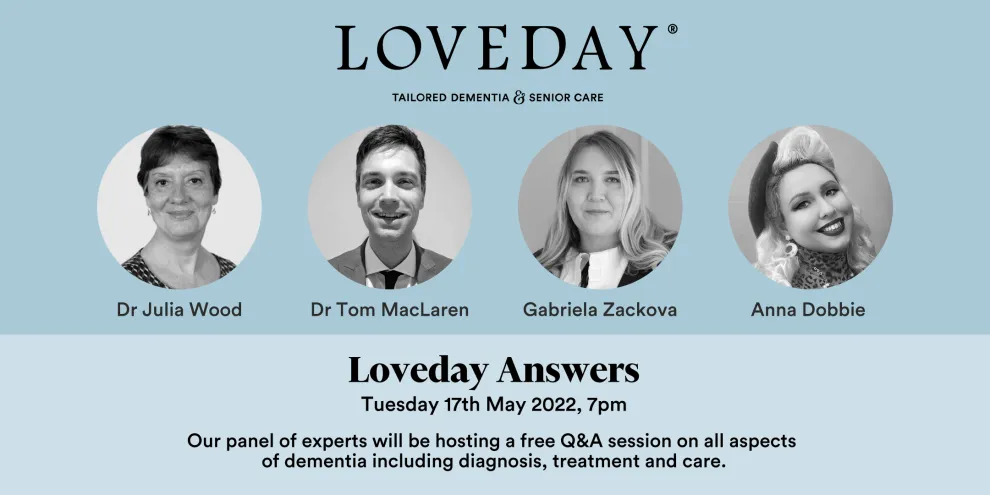Loveday Answers was a free online webinar hosted through Dementia Action Week, to answer questions from members of the public on anything dementia-related.
Dementia Action Week is a national awareness event from the Alzheimer’s Society, designed to take action to improve the lives of people affected by dementia, and those around them. The theme this year was diagnosis.
As a leading provider of specialist dementia care, Loveday invited a panel of leaders in dementia diagnosis, treatment and care to take part in an online Q&A session.
Chaired by Anna Dobbie, editor of Caring Times magazine, the panel of experts included Dr Julia Wood, Consultant in Practice Improvement and Dementia Care Consultant, Dr Tom MacLaren, Consultant Psychiatrist at Re:Cognition Health, and Gabriela Zackova, Director of Wellbeing & Dementia at Loveday.
During this live Q&A the public asked questions, addressing everything from the signs & symptoms, the importance of an early diagnosis, medication options, care provisions and what to consider and where to go for help.
Some of the key themes of the webinar included:
Medication- Does “preventative” medication work, when should it be given, and what are the side effects?
Dr Tom explained that a lot of medication can be used to treat symptoms of dementia and the earlier you start, the better. Many medicines have been around for about 20 years, however many come with side effects which may include symptoms such as anxiety and changes in bowel movements.
Dr Wood also explained that there are also non-pharmacological options available such as CBT and it’s really important to lead a healthy lifestyle, exercise and have a good diet. What is good for the heart is also good for the brain!
Is there any preventative medication in the research pipeline?
Dr Tom educated on the huge number of clinical trials in progress and developments are being made in this field. He advised to ask your doctor about possible clinical trials or visit www.recognitionhealth.com who are major centres for international trials of disease-modifying and new symptomatic drugs for Alzheimer’s disease and other neurological conditions. Clinical trials offer the following benefits:
- Accurate diagnosis with the most advanced diagnostic tools
- The chance to slow or stop disease progression
- Only chance to get early access to new generation drugs that will not be available on the market for several years
- Regular health monitoring
- Free to participate with expenses reimbursed
- Contributing to vital research to help future generations
What are the care programmes you offer spouses, partners or family members, who have loved ones living with dementia in a senior living home while the loved one is living; and after their loved one passes away?
Gabby gave an insight into Loveday and explained that when you join Loveday you become a member of the family. Family members are invited to participate in activities and spend quality time with loved ones, with no visiting times. The Loveday Club is a day club for people living with dementia, open from 9-5pm, 7 days a week and hosted within Loveday residences. Members of the Day Club enjoy all of the same outstanding care, services and hospitality, providing respite for the care giver. Family and friends are welcome to join in on activities and the Loveday team are always at the end of the phone to answer questions and support people. Also, the team are there for people after loved ones pass away, offering advice and compassionate support.
What’s the difference between Alzheimer’s and dementia?
Dr Wood explained that dementia is an umbrella term and there are many types, they run into the hundreds. Two thirds of people with dementia have Alzheimer’s. Vascular Dementia is the next most common. People can have a combination of both. Slightly different symptoms and problems, so you need to know what type of dementia you have. Other types are much rarer. Dementia is a progressive illness.
Dr Tom informed that about 2,000 people have Alzheimer’s. Vascular dementia is when the arteries get narrower over time which causes memory trouble or problems with orientation. Alzheimer’s is so gradual that often people don’t realise. Simple exercise or talking about day-to-day activities such as shopping and bills can help the brain.
Further questions were also asked within chat function of the webinar and have been answered below:
I would say that it is better to be proactive than reactive. Looking at care options early is key. Not everyone needs to move to a care home but for some people, care home can be a more appropriate environment at some point. Care homes are adapted for people living with dementia and there are several reasons why people choose to move in and those may include but not be limited to:
Safety, accessibility problems connected to reduced mobility, behaviours that challenge the carers at home, inadequate nutrition or need for specialized diet…
As mentioned before, giving carers time for themselves is crucial. Carers often keep going focusing on the needs of their loved one and overlook their own well-being. You can help by arranging respite for your mother to give her time to recover and focus on her wellbeing by doing something she enjoys.
Answered by Gabby
I think it is important to understand whether the person is clinically in need of supplements and this can be checked by taking a blood sample. If you feel that the person has reduced appetite and is losing weight as a result it may be worth trying different foods, different tastes and textures or food that is easy to pick up and consume. There are also food supplement available over the counter i.e. Fortisip and Ensure and your pharmacist will be able to advise you.
Answered by Dr Tom MacLaren
There are a number of tests for dementia and the test we tend to use most is called the Addenbrooke’s Cognitive Examination III. This takes about 15-20 minutes and generates a score out of 100. It can be a very useful way of testing different areas of memory and other cognitive function, alongside the clinical history and (where needed) a brain scan, which is usually an MRI scan.
We will sometimes use shorter cognitive assessments, such as the Montreal Objective Cognitive Assessment, which is shorter and gives a score out of 30. This also tests cognitive function and different parts of the brain that might be affected by dementia.
Gabby:
“There may come a time it may no longer be appropriate to have a discussion with the person living with dementia themselves bit having an open conversation with their loved ones may be an option. I would ask open questions that would lead them to reflect on their loved one’s needs. An example of this can be: “How do you feel things are going?”
“ Do you feel X’s memory is the same as it’s always been?” “ Have you noticed any changes?”
I also find that sharing some of my own experiences can be helpful. Quite often people can be in denial because they are afraid of change and this may include needing help or needing to move into a care home.
Having an open conversation about what can happen if the person’s needs are not addressed at the right time can be beneficial. As an example, I have experienced people covering their symptoms and withdrawing from their family until they had a major crisis and had to be admitted into hospital and in two cases sectioned under the mental health act.
Sharing this may also help people reflect on whether their current arrangements are sufficient.”
Dr Tom MacLaren:
“In the webinar, I was discussing Donepezil which can be started at a dose of 5mg daily and then is usually increased to 10mg daily after about a month. This is the most commonly prescribed tablets and has a lot of evidence behind it from over 20 years of use in thousands of people with dementia worldwide.
The other very similar tablets are galantamine and rivastigmine. These work in a very similar way. If people have a type of dementia linked to Parkinson’s disease or something called “Lewy Body” dementia, they might start on rivastigmine first. This is also very good at protecting memory and cognitive function.
Rivastigmine can be given as tablets or patches and these medicines are all available in soluble and liquid forms.
The medicine often added to the above tablets is memantine and this is usually prescribed as a “starter pack”. You increase the dose by 5mg every week up to 20 mg per day. The box is very clear and self-explanatory.
People should look at all the exciting trials for the many new tablets that are being tested (in very safe conditions) at Re:Cognition Health”
Have a look at this very useful website for even more info!



